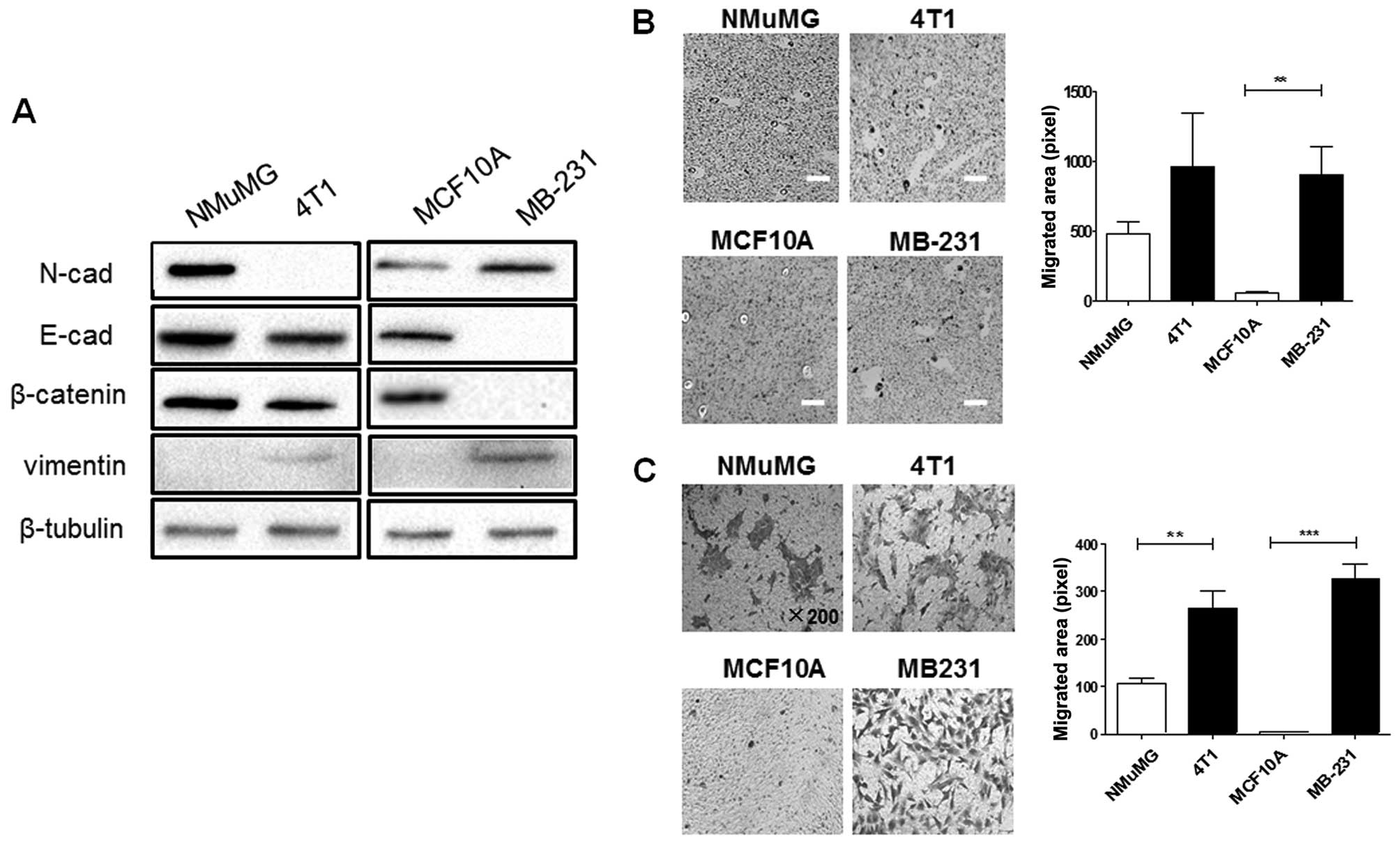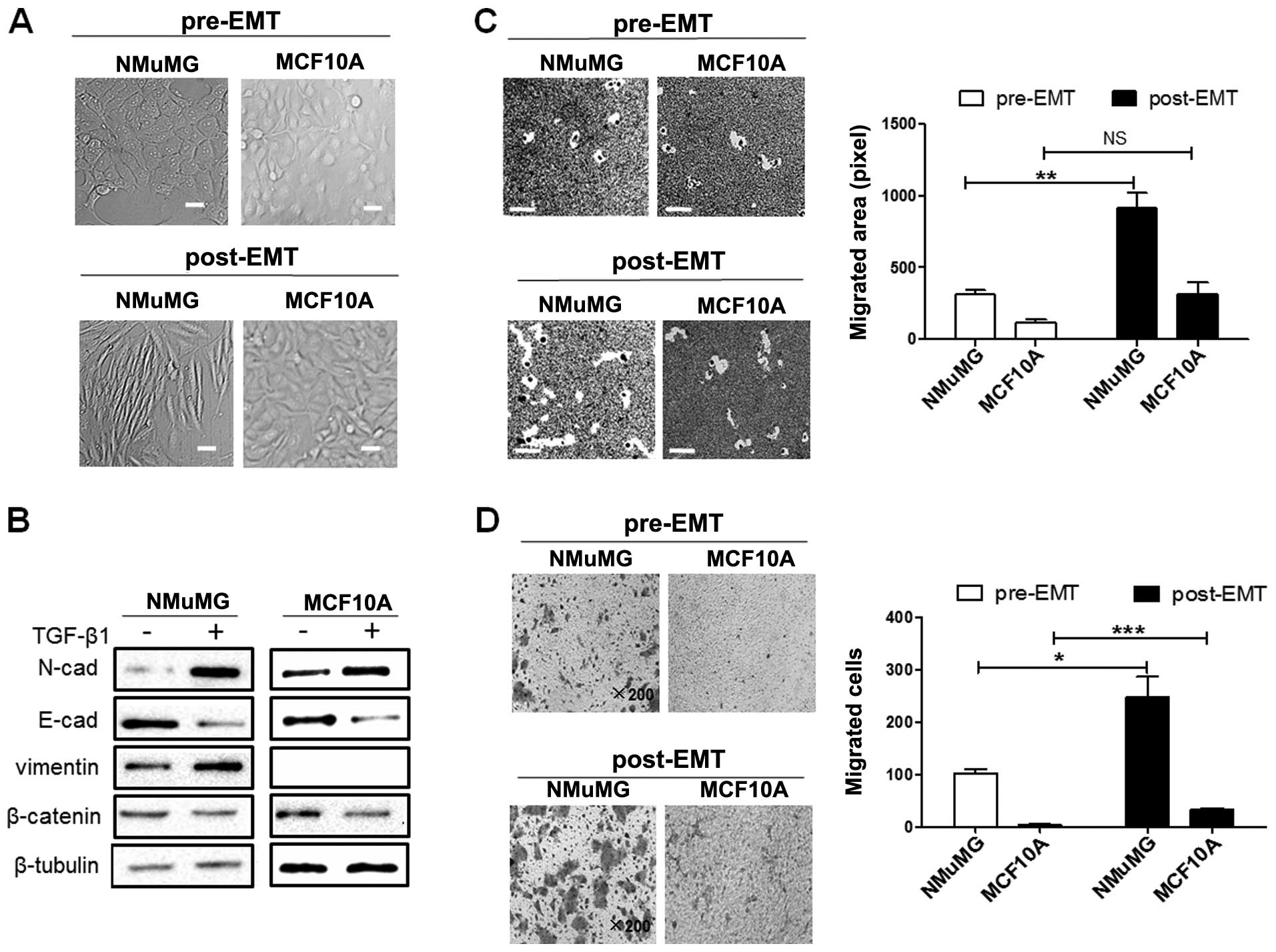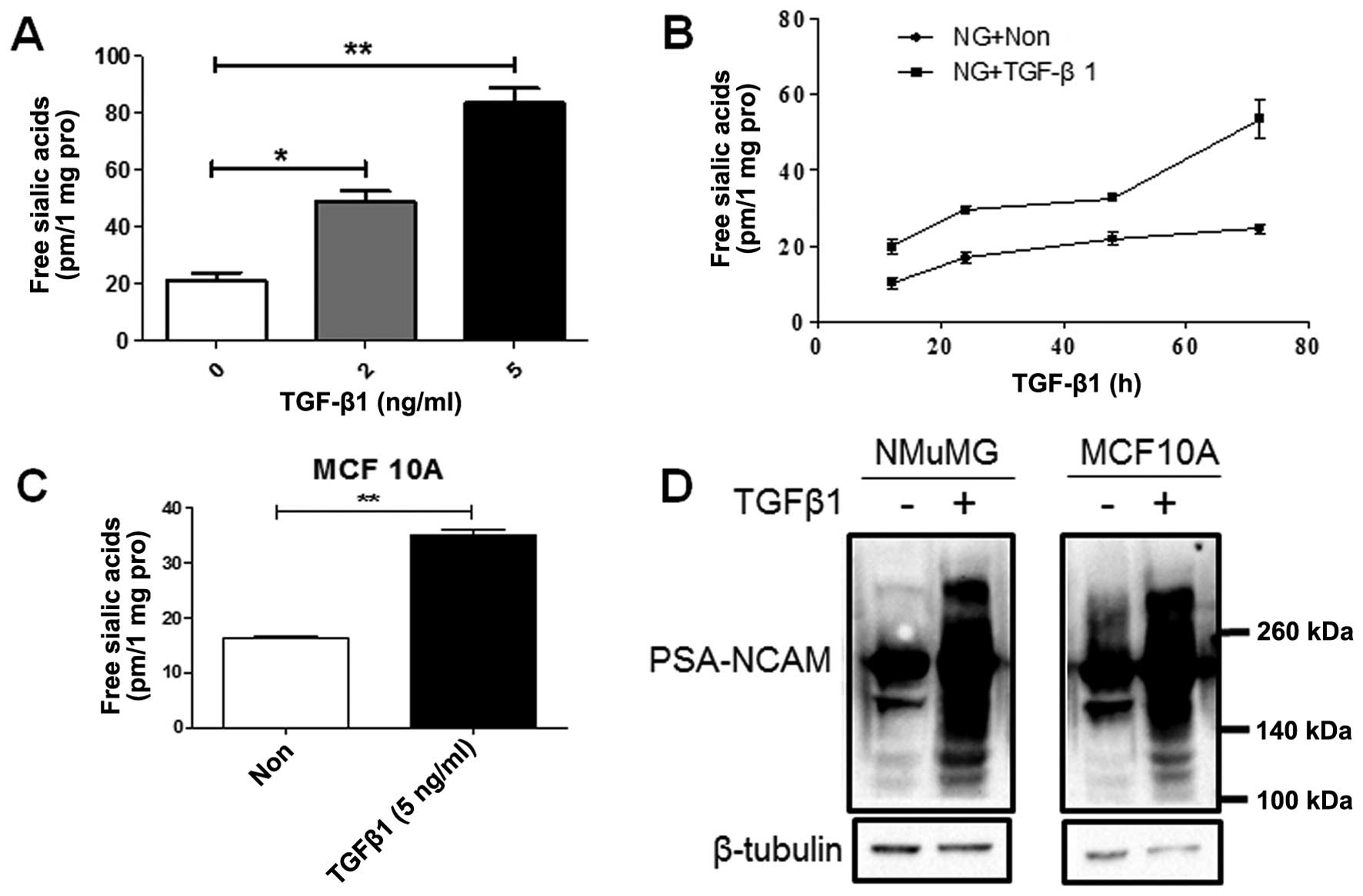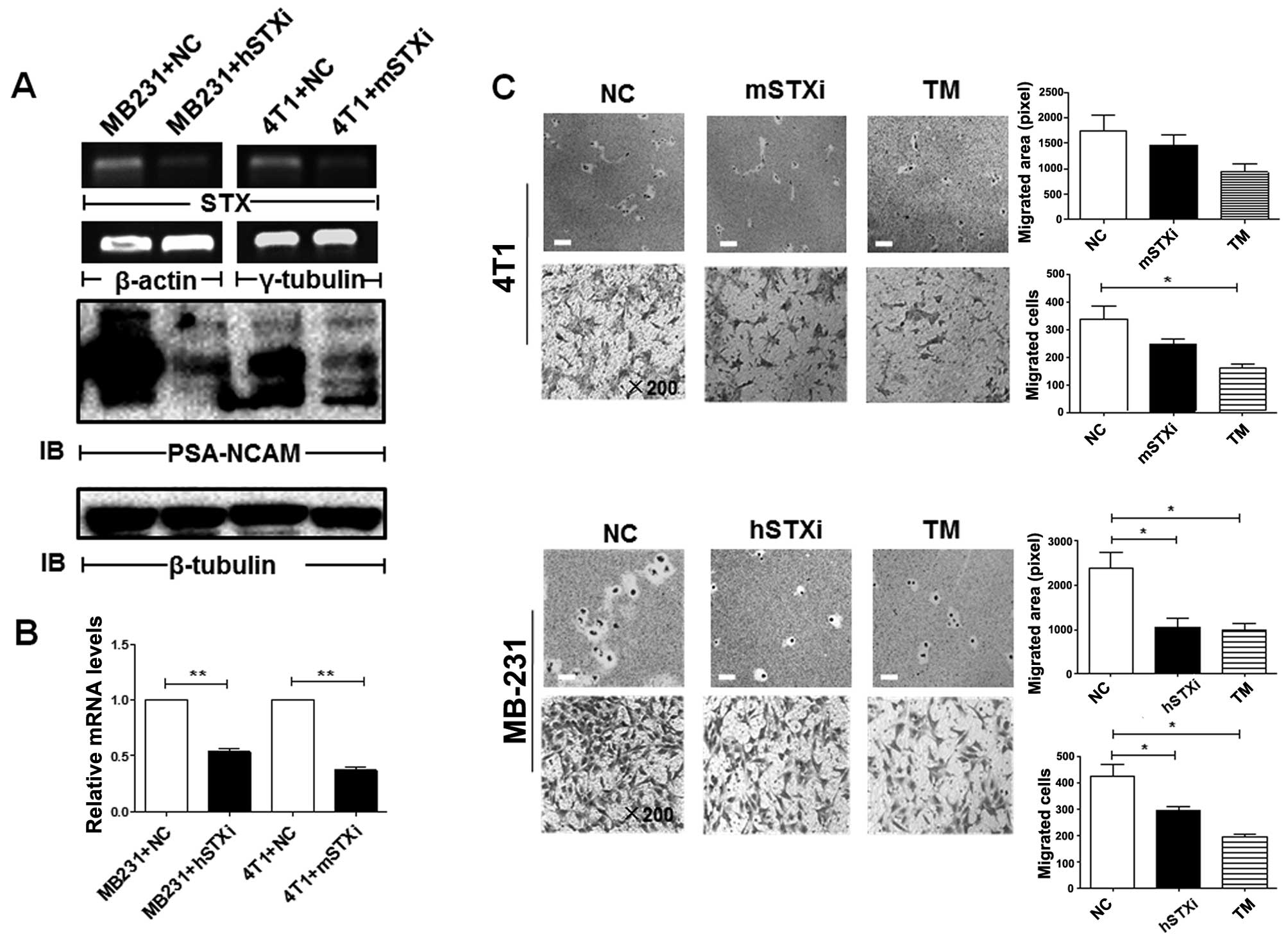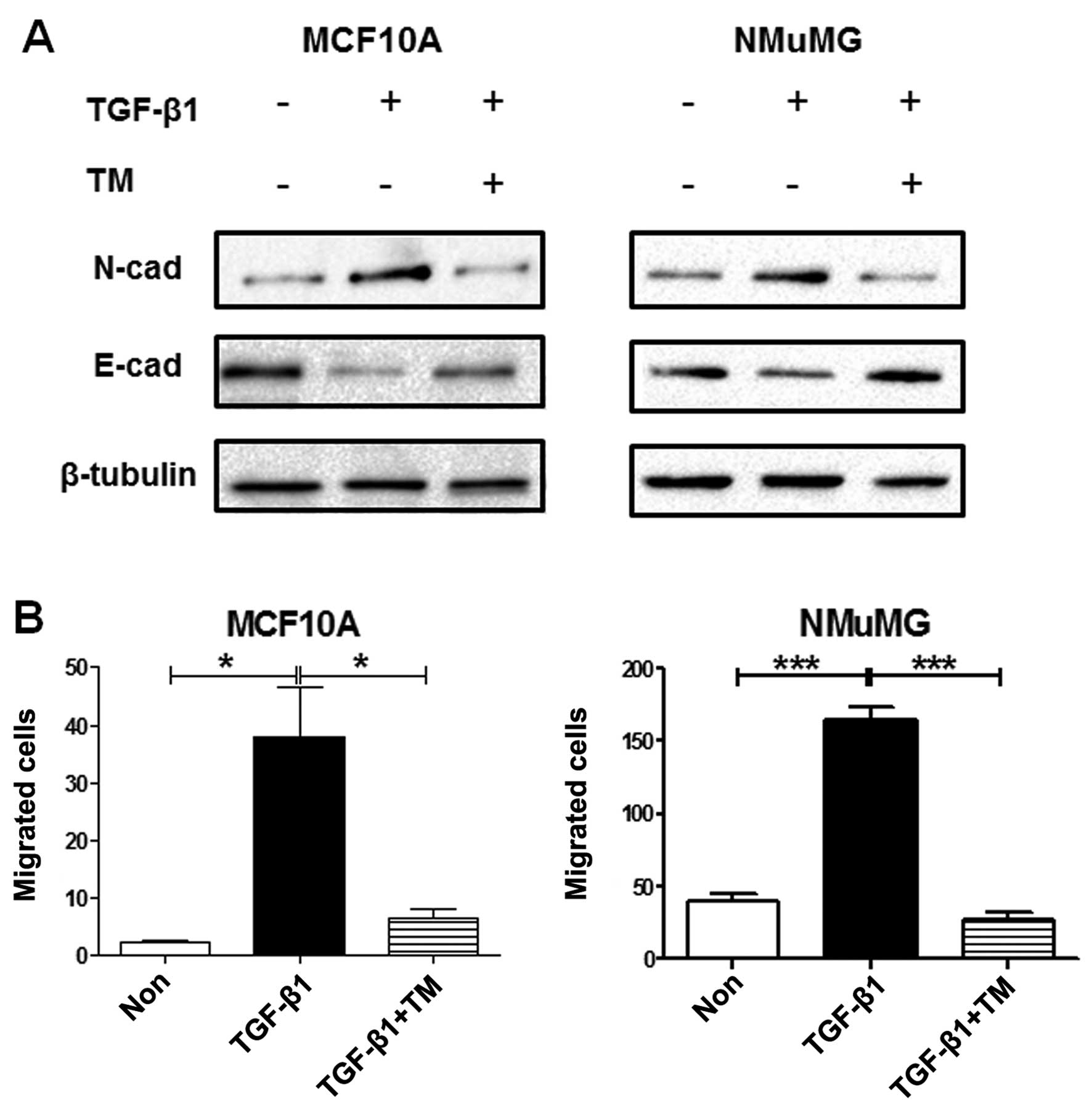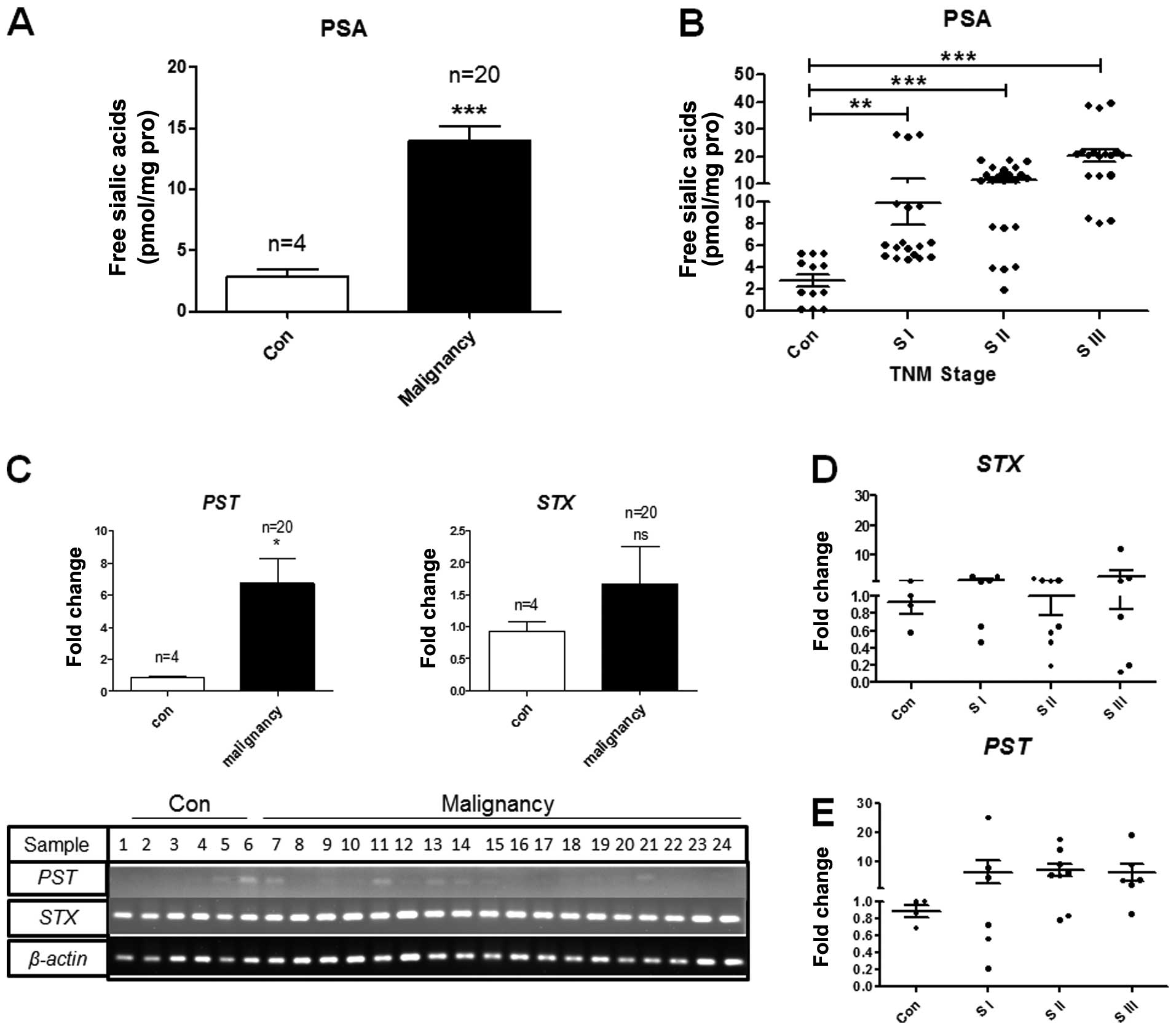|
1
|
Schnaar RL, Gerardy-Schahn R and
Hildebrandt H: Sialic acids in the brain: gangliosides and
polysialic acid in nervous system development, stability, disease,
and regeneration. Physiol Rev. 94:461–518. 2014. View Article : Google Scholar : PubMed/NCBI
|
|
2
|
Cheray M, Petit D, Forestier L,
Karayan-Tapon L, Maftah A, Jauberteau MO, Battu S, Gallet FP and
Lalloué F: Glycosylation-related gene expression is linked to
differentiation status in glioblastomas undifferentiated cells.
Cancer Lett. 312:24–32. 2011. View Article : Google Scholar : PubMed/NCBI
|
|
3
|
Hildebrandt H, Mühlenhoff M and
Gerardy-Schahn R: Polysialylation of NCAM. Adv Exp Med Biol.
663:95–109. 2010. View Article : Google Scholar
|
|
4
|
Scheidegger EP, Lackie PM, Papay J and
Roth J: In vitro and in vivo growth of clonal sublines of human
small cell lung carcinoma is modulated by polysialic acid of the
neural cell adhesion molecule. Lab Invest. 70:95–106.
1994.PubMed/NCBI
|
|
5
|
Kameda K, Shimada H, Ishikawa T, Takimoto
A, Momiyama N, Hasegawa S, Misuta K, Nakano A, Nagashima Y and
Ichikawa Y: Expression of highly polysialylated neural cell
adhesion molecule in pancreatic cancer neural invasive lesion.
Cancer Lett. 137:201–207. 1999. View Article : Google Scholar : PubMed/NCBI
|
|
6
|
Suzuki M, Suzuki M, Nakayama J, Suzuki A,
Angata K, Chen S, Sakai K, Hagihara K, Yamaguchi Y and Fukuda M:
Polysialic acid facilitates tumor invasion by glioma cells.
Glycobiology. 15:887–894. 2005. View Article : Google Scholar : PubMed/NCBI
|
|
7
|
Korja M, Jokilammi A, Salmi TT, Kalimo H,
Pelliniemi TT, Isola J, Rantala I, Haapasalo H and Finne J: Absence
of polysialylated NCAM is an unfavorable prognostic phenotype for
advanced stage neuroblastoma. BMC Cancer. 9:572009. View Article : Google Scholar : PubMed/NCBI
|
|
8
|
Eckhardt M, Mühlenhoff M, Bethe A, Koopman
J, Frosch M and Gerardy-Schahn R: Molecular characterization of
eukaryotic polysialyltransferase-1. Nature. 373:715–718. 1995.
View Article : Google Scholar : PubMed/NCBI
|
|
9
|
Schreiber SC, Giehl K, Kastilan C, Hasel
C, Mühlenhoff M, Adler G, Wedlich D and Menke A: Polysialylated
NCAM represses E-cadherin-mediated cell-cell adhesion in pancreatic
tumor cells. Gastroenterology. 134:1555–1566. 2008. View Article : Google Scholar : PubMed/NCBI
|
|
10
|
Tanaka F, Otake Y, Nakagawa T, Kawano Y,
Miyahara R, Li M, Yanagihara K, Nakayama J, Fujimoto I, Ikenaka K
and Wada H: Expression of polysialic acid and STX, a human
polysialyltransferase, is correlated with tumor progression in
non-small cell lung cancer. Cancer Res. 60:3072–3080.
2000.PubMed/NCBI
|
|
11
|
Raval GN, Parekh LJ, Patel DD, Jha FP,
Sainger RN and Patel PS: Clinical usefulness of alterations in
sialic acid, sialyl transferase and sialoproteins in breast cancer.
Indian J Clin Biochem. 19:60–71. 2004. View Article : Google Scholar : PubMed/NCBI
|
|
12
|
Kalluri R and Weinberg RA: The basics of
epithelial-mesenchymal transition. J Clin Invest. 119:1420–1428.
2009. View
Article : Google Scholar : PubMed/NCBI
|
|
13
|
Yang J and Weinberg RA:
Epithelial-mesenchymal transition: at the crossroads of development
and tumor metastasis. Dev Cell. 14:818–829. 2008. View Article : Google Scholar : PubMed/NCBI
|
|
14
|
Thiery JP: Epithelial-mesenchymal
transitions in tumour progression. Nat Rev Cancer. 2:442–454. 2002.
View Article : Google Scholar : PubMed/NCBI
|
|
15
|
Varki A: Sialic acids in human health and
disease. Trends Mol Med. 14:351–360. 2008. View Article : Google Scholar : PubMed/NCBI
|
|
16
|
Liu T, Guo Z, Yang Q, Sad S and Jennings
HJ: Biochemical engineering of surface alpha 2-8 polysialic acid
for immunotargeting tumor cells. J Biol Chem. 275:32832–32836.
2000. View Article : Google Scholar : PubMed/NCBI
|
|
17
|
Yang X, Pursell B, Lu S, Chang T-K and
Mercurio AM: Regulation of β4-integrin expression by epigenetic
modifications in the mammary gland and during the
epithelial-to-mesenchymal transition. J Cell Sci. 122:2473–2480.
2009. View Article : Google Scholar : PubMed/NCBI
|
|
18
|
Yang G, Cui T, Wang Y, Sun S, Ma T, Wang
T, Chen Q and Li Z: Selective isolation and analysis of
glycoprotein fractions and their glycomes from hepatocellular
carcinoma sera. Proteomics. 13:1481–1498. 2013. View Article : Google Scholar : PubMed/NCBI
|
|
19
|
Tan Z, Lu W, Li X, Yang G, Guo J, Yu H, Li
Z and Guan F: Altered N-Glycan expression profile in
epithelial-to-mesenchymal transition of NMuMG cells revealed by an
integrated strategy using mass spectrometry and glycogene and
lectin microarray analysis. J Proteome Res. 13:2783–2795. 2014.
View Article : Google Scholar : PubMed/NCBI
|
|
20
|
Varki A and Diaz S: The release and
purification of sialic acids from glycoconjugates: methods to
minimize the loss and migration of O-acetyl groups. Anal Biochem.
137:236–247. 1984. View Article : Google Scholar : PubMed/NCBI
|
|
21
|
Livak KJ and Schmittgen TD: Analysis of
relative gene expression data using real-time quantitative PCR and
the 2(−ΔΔC(T)) method. Methods. 25:402–408. 2001. View Article : Google Scholar
|
|
22
|
Albrecht-Buehler G: The phagokinetic
tracks of 3T3 cells. Cell. 11:395–404. 1977. View Article : Google Scholar : PubMed/NCBI
|
|
23
|
Guan F, Handa K and Hakomori SI: Specific
glycosphingolipids mediate epithelial-to-mesenchymal transition of
human and mouse epithelial cell lines. Proc Natl Acad Sci USA.
106:7461–7466. 2009. View Article : Google Scholar : PubMed/NCBI
|
|
24
|
Grosheva I, Shtutman M, Elbaum M and
Bershadsky AD: p120 catenin affects cell motility via modulation of
activity of Rho-family GTPases: A link between cell-cell contact
formation and regulation of cell locomotion. J Cell Sci.
114:695–707. 2001.PubMed/NCBI
|
|
25
|
Hosokawa N, Wada I, Hasegawa K, Yorihuzi
T, Tremblay LO, Herscovics A and Nagata K: A novel ER
α-mannosidase-like protein accelerates ER-associated degradation.
EMBO Rep. 2:415–422. 2001. View Article : Google Scholar : PubMed/NCBI
|
|
26
|
Watanabe S, Kokuho T, Takahashi H,
Takahashi M, Kubota T and Inumaru S: Sialylation of N-glycans on
the recombinant proteins expressed by a baculovirus-insect cell
system under β-N-acetylglucosaminidase inhibition. J Biol Chem.
277:5090–5093. 2002. View Article : Google Scholar
|
|
27
|
Barranco WT and Eckhert CD: Cellular
changes in boric acid-treated DU-145 prostate cancer cells. Br J
Cancer. 94:884–890. 2006. View Article : Google Scholar : PubMed/NCBI
|
|
28
|
Adorno M, Cordenonsi M, Montagner M,
Dupont S, Wong C, Hann B, Solari A, Bobisse S, Rondina MB, Guzzardo
V, et al: A Mutant-p53/Smad complex opposes p63 to empower
TGFbeta-induced metastasis. Cell. 137:87–98. 2009. View Article : Google Scholar : PubMed/NCBI
|
|
29
|
Kelishadi R, Hashemi Pour M, Famouri F,
Sabet B and Sanei M: The impact of breast-feeding in prevention of
obesity in children. J Qazvin Univ Med Sci. 9:88–93. 2005.
|
|
30
|
Gunasinghe NP, Wells A, Thompson EW and
Hugo HJ: Mesenchymal-epithelial transition (MET) as a mechanism for
metastatic colonisation in breast cancer. Cancer Metastasis Rev.
31:469–478. 2012. View Article : Google Scholar : PubMed/NCBI
|
|
31
|
Christofori G: New signals from the
invasive front. Nature. 441:444–450. 2006. View Article : Google Scholar : PubMed/NCBI
|
|
32
|
Gupta GP and Massagué J: Cancer
metastasis: building a framework. Cell. 127:679–695. 2006.
View Article : Google Scholar : PubMed/NCBI
|
|
33
|
Dall'Olio F and Chiricolo M:
Sialyltransferases in cancer. Glycoconj J. 18:841–850. 2001.
View Article : Google Scholar
|
|
34
|
Gotzmann J, Mikula M, Eger A,
Schulte-Hermann R, Foisner R, Beug H and Mikulits W: Molecular
aspects of epithelial cell plasticity: implications for local tumor
invasion and metastasis. Mutat Res. 566:9–20. 2004. View Article : Google Scholar : PubMed/NCBI
|
|
35
|
Falconer RA, Errington RJ, Shnyder SD,
Smith PJ and Patterson LH: Polysialyltransferase: a new target in
metastatic cancer. Curr Cancer Drug Targets. 12:925–939. 2012.
View Article : Google Scholar : PubMed/NCBI
|
|
36
|
Lin S, Kemmner W, Grigull S and Schlag PM:
Cell surface alpha 2,6 sialylation affects adhesion of breast
carcinoma cells. Exp Cell Res. 276:101–110. 2002. View Article : Google Scholar : PubMed/NCBI
|
|
37
|
Tanaka F, Otake Y, Nakagawa T, Kawano Y,
Miyahara R, Li M, Yanagihara K, Inui K, Oyanagi H, Yamada T, et al:
Prognostic significance of polysialic acid expression in resected
non-small cell lung cancer. Cancer Res. 61:1666–1670.
2001.PubMed/NCBI
|
|
38
|
Angata K, Suzuki M and Fukuda M: ST8Sia II
and ST8Sia IV polysialyltransferases exhibit marked differences in
utilizing various acceptors containing oligosialic acid and short
polysialic acid. The basis for cooperative polysialylation by two
enzymes. J Biol Chem. 277:36808–36817. 2002. View Article : Google Scholar : PubMed/NCBI
|















